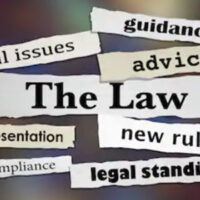Can A Court Case Be Both Criminal And Civil?

The justice system in the U.S. consists of two different bodies:
- Criminal laws
- Civil laws
Criminal laws apply when a person commits a crime such as murder, robbery, embezzlement, arson, bribery, assault, or any other kind of crime. In contrast, civil laws refer to laws that apply to almost all other disputes. Civil laws govern cases such as family and personal injury cases. All cases involving crime go to a criminal court, and all cases involving other disputes go to a civil court.
Apart from the laws governing criminal cases being different from those governing civil cases, there are other differences between criminal cases and civil cases.
Differences Between a Civil Case and a Criminal Case
Firstly, criminal cases are filed by the government, whereas civil cases are filed by private parties. When the government files a criminal lawsuit, it files a case against someone for committing a criminal offense. On the other hand, when a private party (an individual or business) files a civil lawsuit, they do so against another party because of a dispute or problem between them.
The second difference is in the “standard of proof” necessary to win a case. Criminal cases require the prosecution to prove their case using the evidentiary standard known as “beyond a reasonable doubt.” In contrast, civil lawsuits require the standard of proof known as “preponderance of the evidence.” The “beyond a reasonable doubt” evidentiary standard is a very high standard. Generally, even the slightest doubt regarding a defendant’s guilt can result in a no-guilty result when it comes to criminal cases.
Can a Court Case Be Both Criminal and Civil?
Yes, a court case can be both criminal and civil. This can happen when a person commits a criminal offense and a legal wrong against another person or business with the same conduct. For example, suppose a drunk driver hits another driver, pedestrian, or even a cyclist and kills them. In such a case, the driver will be charged with DUI in a criminal court, and the deceased person’s family might file a wrongful death suit against the driver in a civil court. If this happens, the driver will face both a criminal and civil case.
In the case of the driver charged with DUI, their criminal case might result in jail time. In contrast, their civil case would most likely result in the driver being ordered to compensate the deceased person’s family. Usually, civil cases do not result in jail time.
Can a Civil Case Turn Into a Criminal Case?
A civil case can turn into a criminal case. If, during your civil case, the court uncovers evidence hinting that you committed a crime, your civil case might turn into a criminal case. However, it is essential to note that when a civil case turns into a criminal case, a new criminal case must begin in a criminal court. This is because civil cases and criminal cases have different proceedings.
Contact an NYC Criminal Defense Attorney
Do you have questions about criminal cases? Are you facing criminal charges and looking for a qualified criminal defense attorney to help you with your case? If so, contact the skilled and dedicated NYC criminal defense attorney Mark I. Cohen at 917-414-8585 today to schedule a consultation.
Resource:
law.cornell.edu/wex/beyond_a_reasonable_doubt
